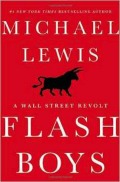There are three stages of emotion when reading Michael Lewis Flash Boys: outrage, mild boredom and then complacency. Never has an expos burned so bright and faded so quickly, once you come to the end of its 270 pages, some which feel padded. While supporters of high-frequency trading bristle at the allegations of a rigged market, and critics of high-speed trading wonder what took everyone so long, our opinions ultimately do not matter. Flash Boys will serve as another reminder to average investors that the U.S. markets have curdled to the point where fairness is a quaint concept.

Flash Boys is a typical Michael Lewis story. He has carved out an immensely successful career by shining a light on bad actors doing terrible things and good people trying to think differently. Think of Moneyballs Billy Beane as he brings metrics to Major League Baseball or the white upper-class mother who brings a talented and troubled African-American athlete into her home in The Blind Side. With Flash Boys, Lewis reveals how technology has warped whatever sense of fairness existed on Wall Street and he has ordained another plucky hero who takes on a rogue industry. Enter Brad Katsuyama.
Katsuyama is the perfect definition of a nice trader from Canada where good manners and fairness are valued over raucous behavior and high risks. Lewis clearly loves the picture of this modest mouse as he moves to New York after the Royal Bank of Canada acquires an American electronic trading firm with a boorish jock culture. While trading at the respectful if sleepy RBC, Katsuyama grows suspicious when the price of his trades jump by a few pennies the instant he executes an order. Sure, its only a few pennies per share, but someone is scooping up his intended orders and offering to sell them back to him before his finger leaves his keyboard. Hes not the only one to notice this. Rich Gates, a fund manager in Pennsylvania, took his findings to the SEC. (Traders interviews the whistleblower of Flash Boys on page 15).
Katsuyama investigates the emerging HFT world and soon discovers that only a few people in the tight-knit financial markets have a clue as to what is going on. This is where Flash Boys shines. We meet the Irish-born Ronan Ryan, who comes to America and finds a job at a telecom firm, only to land a job at a major Wall Street firm where he oversees their new high-speed trading infrastructure. Ryan struggles to explain his ideas or voice his suspicions without dropping choice F-bombs in every straitlaced meeting. Another Katsuyama colleague trolls LinkedIn for high-speed trading experts-update that profile!-and we also meet Don Bollerman, a burly, no-nonsense trading technologist who rips the filters off his cigarettes and tries to make sense of a world that is trading too fast for its own good. These scenes recall a heist movie, but instead of breaking into the bank vault, Brad and his gang form a buyside dark pool that will slow down the HFT raiders.
After showing the formation of Katsuyamas IEX, Flash Boys loses steam. While Lewis points out evidence of front-running, price manipulation and exchanges selling previews of their data feeds, he strains to find an HFT victim. The notion that mom-and-pop investors, the so-called Main Street victims of the Wall Street huns, do not have access to high-speed trading is ludicrous. If Ma and Pa have an account with a halfway decent brokerage, they have access to high-speed trading. They may not be the fastest, due to IT budgets and the laws of physics, but their brokers are trading at super-fast speeds.
Will Flash Boys be remembered beyond its stellar debut? The book may sizzle and soon fizzle like a childs Fourth of July sparkler, but it might also prove to be a shining light for prosecutors and regulators. There are rumblings of hearings and legal probes, and three traders have filed a lawsuit against the CME for unfair data feed practices. If we see a new law passed that slows down HFT-say, a speed bump or a fine on canceled orders-then we will have our answer. Ultimately, the true test of Flash Boys will be if the Securities and Exchange Commission hits the refresh button on Reg NMS.
In the meantime, Lewis has introduced the outside world to HFT and the public has another reason to be suspicious of Wall Street. This may be the lasting legacy of Lewis and Katsuyama and his IEX team.




